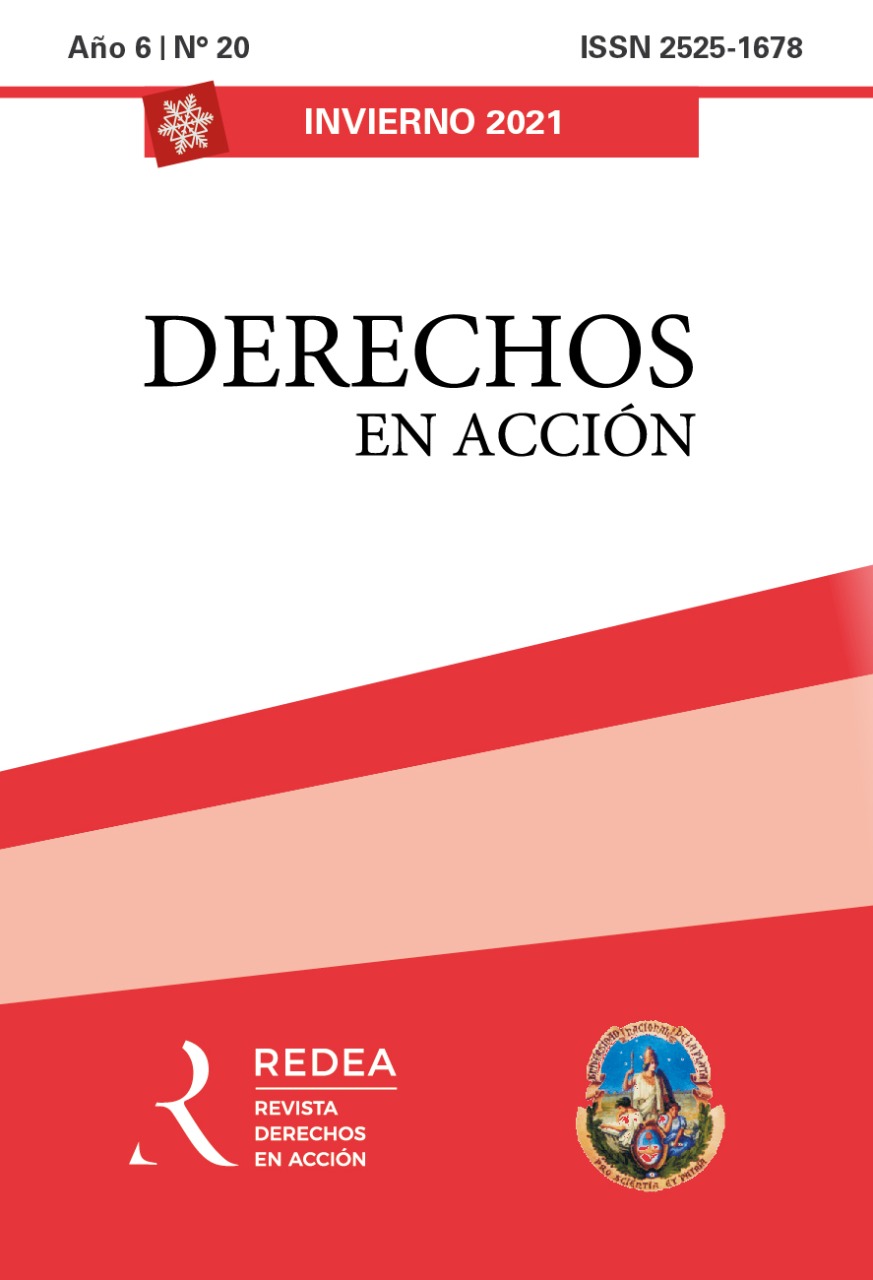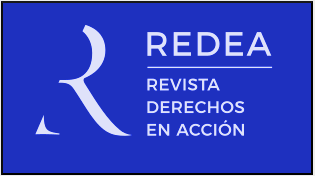La “jurisdicción exorbitante” del poder judicial norteamericano
El caso de los fondos buitre contra la República Argentina
DOI:
https://doi.org/10.24215/25251678e537Palabras clave:
deuda soberana, fondos buitre, cortes federales, legislación estadounidenseResumen
Este artículo analiza dos instancias procesales del caso NML Capital v. Republic of Argentina (2013-2014). En este caso, conocido como “el juicio del siglo”, los acreedores de deuda Argentina emitida bajo legislación estadounidense iniciaron acciones legales contra el país ante cortes federales del Estado de Nueva York. La forma en que NML fue resuelto demuestra que, para ejecutar sus sentencias, las cortes de estadounidenses pueden restar importancia a derechos constitucionales como el debido proceso y el derecho de defensa en pos de asegurar el efectivo cumplimiento de lo ordenado. Como si el fi n de ejecutar la decisión se pudiera imponer sobre los medios a emplear. En particular, el análisis se enfoca en dos etapas del caso, posteriores a la sentencia defi nitiva que condenó a Argentina a pagarle a los fondos buitre. Analiza si las cortes de EE.UU. tienen jurisdicción para emitir (1) una orden de discovery para identifi car bienes argentinos radicados fuera de EE.UU y (2) una orden de hacer de carácter permanente que obligue al país a pagar de igual forma a los acreedores que aceptaron la reestructuración de la deuda y a los que no lo hicieron. También analiza la estrategia que implementó el Juez Thomas Griesa para forzar a la Argentina a cumplir con sus sentencias defi nitivas. Luego de NML v. Argentina, la Suprema Corte de Justicia estadounidense cambió el criterio en materia de jurisdicción contra extranjeros. Gracias a este nuevo criterio, se redujeron sustancialmente las herramientas que las cortes de primera instancia utilizaban para coaccionar a países juzgados a cumplir con sus sentencias defi nitivas. Este cambio dejó aún más en evidencia que las controversias sobre deuda soberana requieren de un marco normativo y fuero internacional específi co para ser resueltas.
Referencias
AGENCIA TELAM (2015). “Los nueve principios del proyecto aprobado por la ONU para reestructurar las deudas de los países”
BARR, Mallory (2016). “The litigation tango of La Casa Rosada and the vultures: the political realities of sovereign debt, vulture funds and the Foreign Sovereign Immunities Act” en Santa Clara Journal of International Law, pp. 575
BERIZONCE, Roberto O (2008). “Rol del Juez y función social del proceso”, Librería Editorial Platense, La Plata.
BLACKMAN, Jonathan I; MUKHI, Rahul (2010). “The evolution of modern sovereign debt litigation: vultures, alter egos, and other legal fauna” en Law and Contemporary Problems, Duke Law, pp. 51.
BLACKMAN, Josh (2011). How can the Court asume without deciding that a right exists?
BÖHMER, Martín; SALEM, Tatiana (2010). Litigio estratégico: una herramienta para que el Poder Judicial tenga voz en políticas públicas clave, CIPPEC.
BOOKMAN, Pamela K (2015). “Litigation Isolationism” en Stanford Law Review, pp. 1140.
BRATTON, William W (2004). “Pari Passu and A Distressed Sovereigns Rational Choices” en Emory Law Journal, pp. 823.
BURRES, Joshua (2015). “Sovereign Disobedience: the role of U.S. courts in curtailing the proliferation of sovereign default” en Indiana International & Comparative Law Review, pp. 283.
CABANELLAS DE LAS CUEVAS, Guillermo; HOAGUE, Eleanor C. (2010). Law Dictionary, Ed. Heliasta, pp. 521
CAMPBELL, Ray W (2020) “Personal jurisdiction and national sovereignty” en Washington and Lee Law Review, pp. 110
CHAYES, Abram (1976). “The role of the Judge in Public Law Litigation” en Harvard Law Review.
CHEMERINSKY, Erwin (2016). "Procedural Due Process Claims" en Touro Law Review, pp. 871.
CLERMONT, Kevin M; PALMER, John R. B. (2006). “Exorbitant Jurisdiction” en Maine Law Review, pp. 474.
CROSS, Karen Halverson (2014). U.S. Supreme Court Denies Certiorari and Affirms Discovery en Bondholder Litigation against Argentina, The American Society of International Law, Vol. 18 Issue 23
CRUCES, Juan J; SAMPLES, Tim R (2016). “Settling sovereign debt´s ‘Trial of the century’” en Emory International Law Review, pp. 14.
DENVIR, John (1976). “Towards a Political Theory of Public Interest Litigation” en North Carolina Law Review.
FERRER ARROYO, Francisco Javier (2015). “El Debido Proceso desde la perspectiva de la Corte Interamericana de Derechos Humanos” en Revista Jurídica de la Universidad de Palermo, ISSN 0328-5642, Año 14, No. 1.
FISHER, John M (2014). “Starving the Vultures: NML Capital v. Republic of Argentina and Solutions to the Problem of Distressed-Debt Funds” en California Law Review, pp. 1674.
FREER, Richard (2019). Symposium – “Justice Black was right about International Shoe, but for the wrong reason” en University of the Pacific Law Review, pp. 600.
GULATI, Mitu, SCOTT, Robert E (2011). “The three-and-a-half-minute transaction: boilerplate and the limits of contract design” en Hofstra Law Review, pp. 2 (2011).
GULATI, Mitu; SCOTT, Robert E (2011). “The three and a half minute transaction: Boilerplate language and the limits of contract design” en Hofstra Law Review, pp. 2.
HALVERSON CROSS, Karen (2015). “The extraterritorial reach of Sovereign Debt enforcement” en Fourth Biennial of Global Conference of the Society of International .
ISSACHAROFF, Samuel (2017). Civil Procedure, Foundation Press 4th Ed. pp, 45
JONES, Imogen (2011). “Still just rhetoric? Judicial discretion and Due Process” en Liverpool Law Review, pp. 255.
KANE, Mary K (2019). “Chapter 9: Provisional and final remedies and special proceedings, Wright & Miller” en Federal Practice and Procedure.
KING, Irene P (2003). “Are Foreign Sovereigns Entitled to Constitutional Due Process - The Ninth Circuit's Analysis of Personal
Jurisdiction in Altmann v. Republic of Austria” en North Carolina Journal of International Law and Commercial Regulation, pp. 391.
KUPELIAN, Romina; RIVAS, María Sol (2014). Fondos Buitre: el juicio contra Argentina y la dificultad que representan en la economía mundial, Centro de Economía y Finanzas para el Desarrollo de la Argentina (CEFIDAR), pp. 7
KUPELIAN, Romina; RIVAS, María Sol (2014). Fondos Buitre: el juicio contra Argentina y la dificultad que representan en la economía mundial, Centro de Economía y Finanzas para el Desarrollo de la Argentina, pp. 5.
MANDER, Benedict (2014). Slow painful ending for “trial of the century”, Financial Times, 18/02/2014.
MANNING, John F. (2006). “What divides textualists from purposivists?” en Columbia Law Review, pp. 70.
MARTINDALE, Colin (2019). “Don’t cry for me Argentina: The aftermath of Republic of Argentina v. NML Capital and the uncertain limits of post-judgement attachment discovery against foreign sovereigns” en Berkeley Journal of International Law, pp. 524
MEGLIANI, Mauro (2015). “Sovereign Debt: genesis, restructuring, litigation” en Springer International Publishing Switzerland, pp. 400.
NEVE, Bett (2014). “NML Capital, Ltd. v. Republic of Argentina: An alternative to de Inadequate Remedies under the Foreign Sovereign Immunities Act” en North Carolina Journal of International Law and Commercial Regulation, pp. 635.
OLIVARES-CAMINAL, Rodrigo (2011) The pari passu interpretation in the Elliot Case: a brilliant strategy but an awful mid-long term outcome? pp. 44/45.
ORN, Gary B; RUTLEDGE, Peter B (2018). International Civil Litigation in United States Courts, Aspen Casebook Series, Sixth Edition, pp. 630.
PARK, Nathan S (2017). Equity extraterritoriality, Duke Journal of Comparative & International Law, pp. 106.
RAUSTIALA, Kal (2009). “Does the Constitution follow the flag? Territoriality and extraterritoriality” en American Law, UCLA School of Law Research Paper N˚ 08-34, pp. 7.
REDISH, Martin H; MARSHALL, Lawrence C (1986). “Adjudicatory Independence and the Values of Procedural Due Process” en Yale Law Journal, pp. 485.
REDISH, Martin; AMARULU, Uma (2006). “The Supreme Court, the Rules Enabling Act, and the Politicization of the Federal Rules: Constitutional and Statutory Implications” en Minnesota Law Review, pp. 1303.
RETH, Jordan (2015). “Jordan Reth, Just Your Run-of-the-Mill Sovereign Debt Crisis: An Analysis of Republic of Argentina v. NML Capital, Ltd.” En Maryland Journal of International Law, pp. 158.
ROCKLAGE, Andrew (2013). “International law – Neglected consequences of the Terrorism Exception to the Foreign Sovereign Immunities Act – Leibovitch v. Islamic Republic of Iran” en Suffolk Transnational Law Review, pp. 484 (2013).
ROSENHECK, Dan (2014). “Argentina´s rational default” en The New Yorker, August 7, 2014.
SABEL, Charles F; SIMON, William H (2004). “Destabilization rights: How Public Law Litigation Succeeds” en Harvard Law Review.
SHAPIRO, David L (1985). “Jurisdiction and discretion” en New York University Law Review, pp. 546 (1985).
SILBERMAN, Linda J; SIMOWITZ, Aaron D. (2016). “Recognition and enforcement of foreign judgments and awards: what hath Daimler wrought?” en New York University Law Review, pp. 393.
SIMOWITZ, Aaron D. (2015). “Transnational enforcement discovery” en Fordham Law Review, pp. 3300.
STEWART David P (2013). “The Foreign Sovereign Immunities Act: A guide for judges” en Federal Judicial Center, International Litigation Guide, pp. 2
STIGLITZ, Joseph E; GUZMÁN (2017). “Argentina default? Griesafault is much more accurate” en The Guardian, 07/08/2017.
STIGLITZ, Joseph E; GUZMÁN, Martín (2017). “Griesafault is much more accurate” en The Guardian, 07/08/2017.
SULLIVAN, Thomas E; MASSARO, Toni M (2013). “Arc of due process” en American Constitutional law, Oxford University, pp. 82.
TAYLOR, Leslie L (2011). The evolution of Black´s Law Dictionary, Canadian Law Library.
TERRY, Joseph M (1999). “Jurisdictional discovery under the Foreign Sovereign Immunities Act” en University of Chicago Law Review, pp. 1029.
UCÍN, María Carlota (2017). “Litigio de interés público” en Revista en Cultura de la Legalidad.
VERBIC, Francisco (2014). Un nuevo proceso para conflictos de interés público, La Ley.
WEIDEMAIER W. Mark C (2014). “Sovereign immunity and sovereign debt” en University of Illinois Law Review, pp. 69.
WEIDEMAIER, Mark C; GELPERN, “Injunctions in sovereign debt litigation” en Georgetown Law Scholarship, pp. 6.
WUERTH, Ingrid (2019). “The Due Process and other constitutional rights of Foreign Nations” en Fordham Law Review, pp. 634.
ZAMBRANO, Diego (2016). “A comity of errors: The rise, fall, and return of international comity in transnational discovery” en Berkeley Journal of International Law, pp. 167
Descargas
Publicado
Número
Sección
Licencia
Derechos de autor 2022 Augusto Martinelli

Esta obra está bajo una licencia internacional Creative Commons Atribución-NoComercial-SinDerivadas 4.0.
Todo el material publicado en la revista lo hace bajo una licencia Creative Commons de Reconocimiento-No Comercial-Sin Obra Derivada (CC BY-NC-ND) 4.0



.jpg)






























